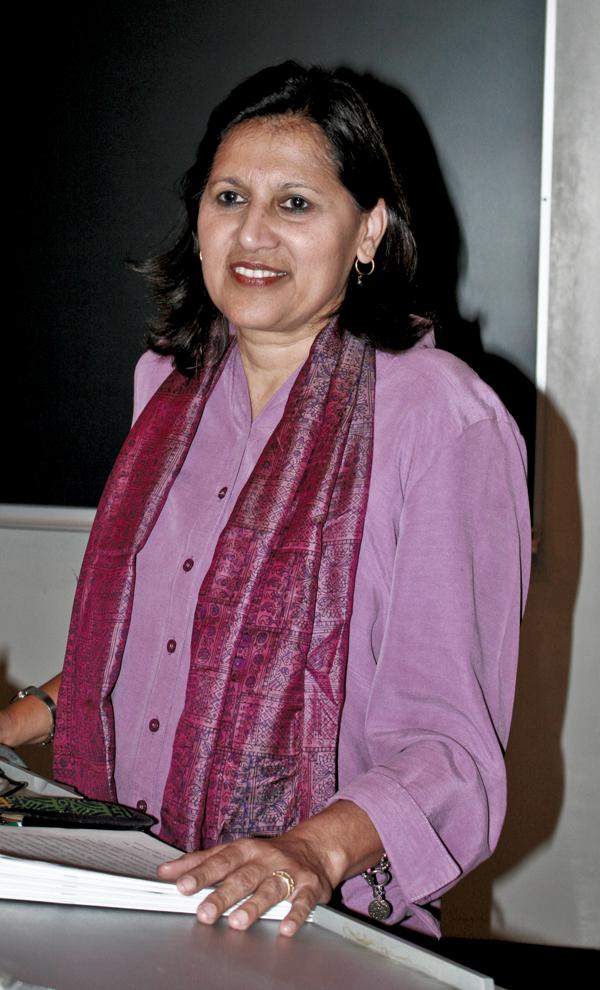
Huma Ahmed-Ghosh, a professor at San Diego State University, lectured on the plight of women in Afghanistan last Friday to kick off the 2011-12 Harpur College Dean’s Speakers Series.
Ahmed-Ghosh, a professor of anthropology, women’s studies and Asian studies, delivered a lecture titled “Afghan Women: Stranded at the Intersection of Local and Global Patriarchies” from 1:30 to 3 p.m. last Friday in Fine Arts Building room 258. She spoke about the conditions in which Afghan women live and the conditions’ political, historical, cultural and economic causes.
The Harpur College Dean’s office awarded funding to the Asian and Asian-American studies department for this year’s Speakers Series.
Women in Afghanistan have suffered much oppression throughout recent decades, particularly at the hands of the Taliban, the militant Islamic group that seized control of Afghanistan in 1996 and ran the country under radically strict Sharia law until it was formally unseated from power in 2001 by U.S. and NATO forces.
Ahmed-Ghosh has been involved in advocating for and bringing attention to the conditions of Afghanistan’s women for the last decade. Since 2003 she has traveled to Afghanistan numerous times to conduct research on the women of the country and the roles of female-run non-governmental organizations in rehabilitating Afghanistan from warfare, which has persisted from 2001 until the present day.
Ahmed-Ghosh said in her lecture that at present various statistics point to an evolving situation and nuanced picture of the opportunities and obstacles Afghan women face.
“The most important statistic is the women representation in parliament, in politics,” Ahmed-Ghosh said. “It’s one of the highest in the world. There are more women than men in Kabul University. And of course on the negative side, [Afghanistan] has the second highest maternal mortality rate … in the world. It’s really a sign of underdevelopment.”
Ahmed-Ghosh claimed that the present war in Afghanistan has led to 10 million refugees, 90 percent of whom are women and children.
She said she thought it was vitally important for students to be educated about real conditions in Afghanistan in order to understand the impacts of the U.S.-led war taking place there.
“We really need to question what war does to women, because every institution regards gender differently,” Ahmed-Ghosh said. “Even in this country, political institutions impact women differently, men differently … What ends up happening is that war becomes a masculine thing and peace becomes a feminine thing. To masculinize and feminize becomes an important issue, so we need to stop that divide.”
She said the goal of her research is to use Afghanistan’s women as a case study to provide global perspective.
“The Afghan women’s example should be used to prevent war, to talk, to be more critical of women’s situation here and in other parts of the world,” she said. “We need to use the … talk about Afghanistan [and] Afghan women to prevent further situations.”
David Stahl, an associate professor of Asian studies and chair of the Asian-American studies department at Binghamton University, said he was impressed by Ahmed-Ghosh’s lecture.
“Well, what I liked about it was that she contextualized it both historically, culturally and politically and she was very good about explaining what has happened over time … [that has caused] the suffering and oppression and abuse of women in Afghanistan,” he said.
Stahl said he was intrigued by Ahmed-Ghosh’s response to an audience member’s question about whether American forces should intervene in Afghanistan.
“I particularly liked that,” Stahl said. “She said that we all need to think about these things both locally and transnationally, that we need to think about, understand and critique patriarchies and their deleterious effects on men, women and children at home before we endeavor to do so abroad.”
Rob Babin, vice president of BU’s Model United Nations chapter, said he found Ahmed-Ghosh’s lecture both insightful and engaging.
“I learned some new things that I was not aware about, about the Afghan situation,” said Babin, a junior majoring in political science. “And I am more consciously aware of the plight of women in Afghan society.”
Babin said he thinks women’s rights are one of many issues that people ought to raise when the discussing the socio-political situation in Afghanistan.
“I believe that although women’s rights are an important issue, overall her argument … was idealistic and it was not realistic to the situation … in Afghanistan,” Babin said. “I think the overarching problem in Afghanistan is a lot of religious and cultural and ethnic ties which really have to addressed by [men] first because they are the ones that have the power, as she discussed; they are the ones in the patriarchy.”


